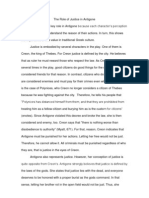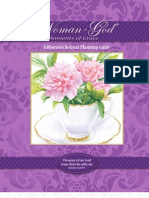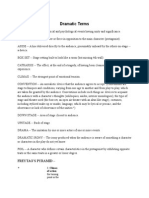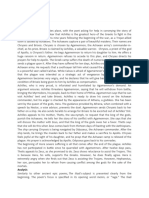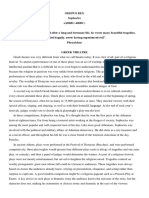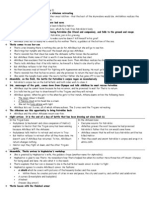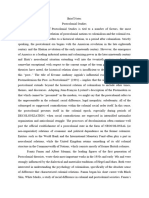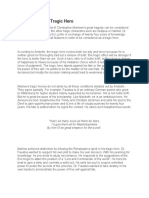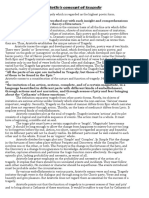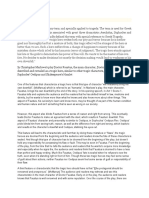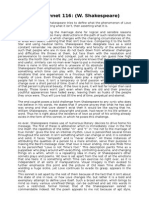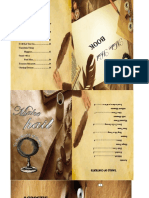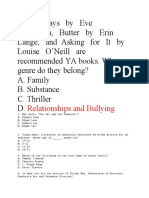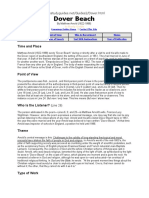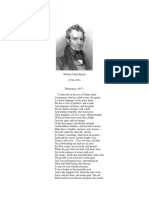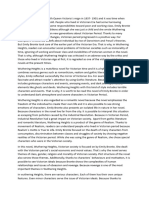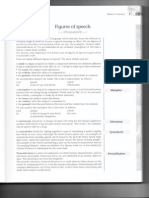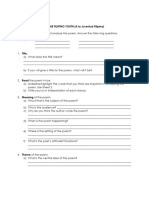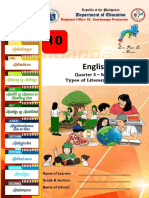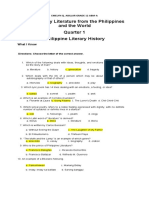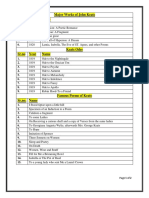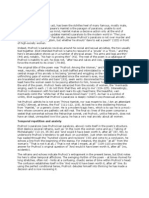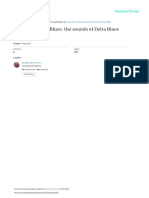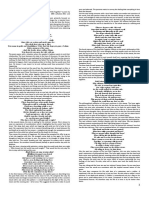Sophocles Antigone
Sophocles Antigone
Uploaded by
Edith Yidi CaoCopyright:
Available Formats
Sophocles Antigone
Sophocles Antigone
Uploaded by
Edith Yidi CaoOriginal Title
Copyright
Available Formats
Share this document
Did you find this document useful?
Is this content inappropriate?
Copyright:
Available Formats
Sophocles Antigone
Sophocles Antigone
Uploaded by
Edith Yidi CaoCopyright:
Available Formats
Introduction and Approaches to Interpretation Western Drama/Spring 2011
Greek cosmology is hierarchical, conservative, ethnocentric and ordered a pre-Christian worldview: no heaven but an afterlife in the realm of shadows (Hades); the shades of our selves retain all aspects of character in afterlife except the physical 5th century Athens (BCE) was enlightened, with stable governance, ruling institutions, scientific advancement and an empire. It was also a slave state.
Renaissance image http://www.departments.bucknell.edu/history /carnegie/aristotle/chainofbeing.html
Aristotle also gave us the great chain of being concept ranking of cosmos strictly hierarchical balancing being and non-being, natural with human systems god(s) as prime mover practically conservative
Note: no notion of humanism or individualism
Elsewhere in the Poetics, Aristotle requires that in order to be effective all drama must possess the three unities: (1) unity of time: all events occur in one day (single revolution of the sun) (2) unity of action (completeness): limited subplots/main narrative thread (e.g. Antigone v. Kreon) and resolution/closure (structural whole) (3) unity of place: stage should not compress geographical spaces
*as subsequently interpreted in Renaissance
According to Aristotle, tragedy must possess:
magnitude: all-encompassing scope and seriousness (god & man) completeness of action (three unities) linguistic adornment (rhetorically distinct from everyday events/language) imitation (mimesis) of noble traits and virtues: arousing pity and terror in audience (provokes catharsis)
given Aristotles belief in hierarchy it is logical that he ranks comedy lower than tragedy the genre that presents the unnatural in the absence of pain or suffering
note: by definition, comedy cannot trigger catharsis)
he defines the genre comedy negatively as:
an imitation error or ugliness of inferior, baser or deformed men and women; and which causes no harmful or painful effects.
four siblings, a cursed father/half-brother (Oedipus), a tyrannical uncle (Kreon)
OEDIPUS = JOCASTA# KREON# = EURIDYCE
ETEOCLES* POLYNEICES* ISMENE ANTIGONE<--->HAEMON#
*feuding brothers kill each other in battle prior to beginning of play (in media res) #Kreon and Jocasta are brother and sister, making Kreon Antigones uncle and Haemon Antigones first cousin
What does x equal? background: recounts events triggering tragedy (e.g. deaths of Eteokles/Polyneices) commentary: witness describing folly of man/woman and moral/ethical issues raised by the play didactic function: to lecture and instruct the audience; to make the implications of events clear
Question: Is Sophocles chorus always reliable?
1) 2)
3)
Example 1: KREON: Think of yourselves, therefore, as the guardian of my pronouncements. . . . KORYPHAIOS: Then what are your orders? KREON: Not to side with rebels. KORYPHAIOS: No one is such a fool. No one loves death. (253-259)
Example 2: CHORUS: I can see the ancient griefs of dead men striking this house, ripped by some god, no relief, generation after Generation, no release. (729-732) Example 3: CHIORUS: You were harsh and daring, child. You went too far and fell broken against the lofty Pedestal of Justice. (1003-1005)
Tragedy is produced not by a conflict between right and wrong, but between competing versions of the truth. Can you think of some examples?
Antigone and Kreon: I didnt suppose your decree had strength enough, or you, who are human, to violate the lawful traditions the gods have not written merely, but made infallible (555-558)
Antigone and Ismene: I do not want love from anyone who loves with speeches (665-666)
Kreon and Haimon: Dont father me. Youre no man. Youre a slave. Property of a woman. (914-15)
Competing sovereignties: kings law versus divine law (meets magnitude requirement) Love (eros) vs. Obedience (ares). Note the strong debate between Kreon and Haimon. Which is better: to be loved or feared by your people? Hubris (pride as fatal flaw). Both Antigone and Kreon possess it: with whom are you more sympathetic? Role of Chorus. Disinterested spectator or selfish subjects?
Sophocles Antigone is one of the oldest plays in the Western tradition and presents key elements of Greek tragedy as Aristotle defines it Characters flaws (hubris) emerge as a consequence of dramatic narrative/events it presents in a dramatic narrative the problem of competing values and sovereignties which entraps its characters producing terror and pity (catharsis)
You might also like
- The Tragedy of Law and The Law of Tragedy in Sophocles' AntigoneDocument34 pagesThe Tragedy of Law and The Law of Tragedy in Sophocles' AntigoneAndrés Cisneros Solari100% (1)
- The Role of Justice in AntigoneDocument3 pagesThe Role of Justice in AntigoneDavid Gomez100% (1)
- Suicide in Hamlet by William Shakespeare PDFDocument3 pagesSuicide in Hamlet by William Shakespeare PDFVirág KovácsNo ratings yet
- Aristotle "Poetics": Aspects of Aristotle "Poetics" in Modern LiteratureDocument7 pagesAristotle "Poetics": Aspects of Aristotle "Poetics" in Modern LiteratureVikram Mishra100% (2)
- Oedipus Rex Socratic Seminar QuestionsDocument6 pagesOedipus Rex Socratic Seminar Questionsapi-312191833No ratings yet
- Expressionism in The Twentieth Century LiteratureDocument11 pagesExpressionism in The Twentieth Century LiteratureNauman Mashwani100% (1)
- Women Retreat PlannerDocument28 pagesWomen Retreat PlannerEnlightened Chick100% (1)
- Dom Casmurro TranslatedDocument15 pagesDom Casmurro TranslatedLuiz Carlos de Oliveira e SilvaNo ratings yet
- Loading... : Archives & ManuscriptsDocument5 pagesLoading... : Archives & ManuscriptsJelenaNo ratings yet
- Structure and Plot of AntigoneDocument5 pagesStructure and Plot of AntigonedlgirNo ratings yet
- Dramatic Terms: Freytag'S PyramidDocument5 pagesDramatic Terms: Freytag'S PyramidAyatalla M. ElgendiNo ratings yet
- An Academy For WomenDocument17 pagesAn Academy For WomenAsena K. Karaca100% (1)
- Tragedy Assignment 2Document6 pagesTragedy Assignment 2tom_j_sharrisNo ratings yet
- Fires in The Mirror: Asymmetry and AngularityDocument2 pagesFires in The Mirror: Asymmetry and AngularityEllie CNo ratings yet
- Antigone's Tragic HeroDocument4 pagesAntigone's Tragic HerofrannieNo ratings yet
- Literary Works and CriticismDocument69 pagesLiterary Works and CriticismDoctora ArjNo ratings yet
- Book 1, Summary and AnalysisDocument3 pagesBook 1, Summary and AnalysisFaisal JahangeerNo ratings yet
- The Eumenides Summary and Analysis of Lines 1Document11 pagesThe Eumenides Summary and Analysis of Lines 1Jaspreet ChandiNo ratings yet
- Doctor FaustusDocument5 pagesDoctor FaustusHiteshSharmaNo ratings yet
- Post Modernism and Feminism in The Select Poems Sylvia PlathDocument13 pagesPost Modernism and Feminism in The Select Poems Sylvia PlathBiljana BanjacNo ratings yet
- Odepus RexDocument27 pagesOdepus RexB. KathiresanNo ratings yet
- Doctor Faustus Final SoliloquyDocument3 pagesDoctor Faustus Final SoliloquygginternationalexchangesNo ratings yet
- Chapter 1Document19 pagesChapter 1Andreea Simina GrkNo ratings yet
- Iliad Book 18 Chapter SummaryDocument2 pagesIliad Book 18 Chapter SummaryantonaquinoNo ratings yet
- ENGL402 Milton Paradise Lost Book 9Document41 pagesENGL402 Milton Paradise Lost Book 9Sidra KhanNo ratings yet
- Brief Notes Postcolonial StudiesDocument8 pagesBrief Notes Postcolonial Studiesawtshfhd100% (1)
- 01 - Roland Barthes - From Work To TextDocument6 pages01 - Roland Barthes - From Work To TextWENXIN LIANGNo ratings yet
- Portrait of An Artist As A Young Man Study GuideDocument1 pagePortrait of An Artist As A Young Man Study Guideshadydogv5No ratings yet
- Eliot's Treatment of The Chorus: A Steady Logical Structure (1) The Rock and Murder in The Cathedral Case in PointDocument7 pagesEliot's Treatment of The Chorus: A Steady Logical Structure (1) The Rock and Murder in The Cathedral Case in PointYahya Saleh Hasan Dahami (يحيى صالح دحامي)No ratings yet
- 304 B (Except Iain Chambers & Shantha Ramakrishnan)Document24 pages304 B (Except Iain Chambers & Shantha Ramakrishnan)Ayushi S.100% (1)
- Sophocles'Antigone and Funeral Oratory (Larry J. Bennett and Wm. Blake Tyrrell)Document17 pagesSophocles'Antigone and Funeral Oratory (Larry J. Bennett and Wm. Blake Tyrrell)IsabelMargaritaJordán100% (1)
- The Elegy Written in A Country Churchyard: Thomas GrayDocument20 pagesThe Elegy Written in A Country Churchyard: Thomas Graymarie91No ratings yet
- Antigone by SophoclesDocument8 pagesAntigone by SophoclesJade A. BalbonNo ratings yet
- All Abuut FaustusDocument20 pagesAll Abuut FaustusAqeel SarganaNo ratings yet
- AristotleDocument4 pagesAristotleabc defNo ratings yet
- Hag-Seed and SorrowDocument40 pagesHag-Seed and SorrowMuresan Dorel Aurel100% (1)
- The Pot of Gold Plautus PDFDocument22 pagesThe Pot of Gold Plautus PDFHiranmay Roy100% (1)
- Piers The PlowmanDocument4 pagesPiers The Plowmansudipto paulNo ratings yet
- Antigone Study Guide-Review Questions Part 3Document4 pagesAntigone Study Guide-Review Questions Part 3FarahNo ratings yet
- Doctor Faustus As A Tragic HeroDocument2 pagesDoctor Faustus As A Tragic HeroAnanya BhatnagarNo ratings yet
- Chief Characteristics of Dryden As A CriticDocument4 pagesChief Characteristics of Dryden As A CriticQamar KhokharNo ratings yet
- Oresteia by AeschylusDocument19 pagesOresteia by AeschylusJolly Anne ArcegaNo ratings yet
- Literary Terms PDFDocument3 pagesLiterary Terms PDFSubhajitNo ratings yet
- John RuskinDocument2 pagesJohn RuskinDiaconuRamyNo ratings yet
- Yeatss Sailing To Byzantium The Poetic Process of PDFDocument17 pagesYeatss Sailing To Byzantium The Poetic Process of PDFNijum MiahNo ratings yet
- The Duchess of Malfi Test Preparation Sample PagesDocument38 pagesThe Duchess of Malfi Test Preparation Sample PagesYugant DwivediNo ratings yet
- Oedipus Rex NotesDocument4 pagesOedipus Rex NotesOli Klix100% (1)
- The Anti-Poet in Mac FlecknoeDocument6 pagesThe Anti-Poet in Mac FlecknoeAravind KazakNo ratings yet
- What Is Aristotle's Definition of TragedyDocument12 pagesWhat Is Aristotle's Definition of TragedyRamesh MondalNo ratings yet
- Essay: Mary Barton Social JusticeDocument9 pagesEssay: Mary Barton Social JusticeDylan Hooper100% (1)
- The Bridge Poem - Donna Kate RushinDocument7 pagesThe Bridge Poem - Donna Kate RushinSony chanNo ratings yet
- Antigone NotesDocument4 pagesAntigone Notespranit singhNo ratings yet
- The Spanish TragedyDocument38 pagesThe Spanish Tragedysreejav169100% (1)
- Analysis: Sonnet 116: (W. Shakespeare)Document2 pagesAnalysis: Sonnet 116: (W. Shakespeare)api-2981200570% (1)
- S. Sulochana Rengachari - T S Eliot - Hamlet and His Problems - An Analysis-Prakash Book Depot (2013)Document50 pagesS. Sulochana Rengachari - T S Eliot - Hamlet and His Problems - An Analysis-Prakash Book Depot (2013)pallavi desaiNo ratings yet
- Russian Literature in The Nineteenth by Rupen GhoshDocument23 pagesRussian Literature in The Nineteenth by Rupen GhoshRupendra Nath GhoshNo ratings yet
- Milton's Samson Agonistes 1890, MacmillanDocument245 pagesMilton's Samson Agonistes 1890, MacmillanCláudia AlvesNo ratings yet
- Greek Theater and Oedipus RexDocument2 pagesGreek Theater and Oedipus RexSofia Rodriguez100% (1)
- Establishing Identity Crisis of Sexual Subalterns Through A Critical Study of Selected Indian Queer LiteratureDocument9 pagesEstablishing Identity Crisis of Sexual Subalterns Through A Critical Study of Selected Indian Queer LiteratureAnanya A. Sahoo100% (1)
- HUMSS 121 Week 11-19-Jayson-Panalandang - Docx Version 1Document28 pagesHUMSS 121 Week 11-19-Jayson-Panalandang - Docx Version 1Dennis QuintanaNo ratings yet
- AcrosticDocument10 pagesAcrosticJane Kyla TruzaNo ratings yet
- Children and Adolescent LittDocument3 pagesChildren and Adolescent LittŠüprå ÄûrāNo ratings yet
- Anchoring Script - Club PinnacleDocument6 pagesAnchoring Script - Club PinnacleftmkhushbooNo ratings yet
- Dover Beach: Time and PlaceDocument5 pagesDover Beach: Time and Placemaryannie82No ratings yet
- The Prosody of The Telugu and Sanscrit L TextDocument141 pagesThe Prosody of The Telugu and Sanscrit L TextBharath Palepu100% (1)
- Ims Lesson 5Document10 pagesIms Lesson 5Zheansie NuñezNo ratings yet
- Death Analysis QuestionsDocument34 pagesDeath Analysis Questionsoffshore11325% (4)
- Liberty The RomanticsDocument41 pagesLiberty The RomanticsNada De NadaNo ratings yet
- Bryant, William Cullen ThanatopsisDocument4 pagesBryant, William Cullen ThanatopsisNasly AguirreNo ratings yet
- Özge ŞaşırmazDocument7 pagesÖzge Şaşırmazcevirgenmuhammedali35No ratings yet
- Fields of VisionDocument79 pagesFields of Visionandryam7100% (1)
- Black Womens Writing - Niel ANTONYDocument13 pagesBlack Womens Writing - Niel ANTONYNiel AntonyNo ratings yet
- 1 To The Filipino Youth Poem Analysis WorksheetDocument4 pages1 To The Filipino Youth Poem Analysis WorksheetJackie Lyn LozadaNo ratings yet
- Iloko LiteratureDocument33 pagesIloko LiteratureerinnicolejaravatacarraoNo ratings yet
- English: Department of EducationDocument16 pagesEnglish: Department of EducationPatricia TombocNo ratings yet
- When We Read Gangadhar MeherDocument3 pagesWhen We Read Gangadhar MeherRajendra PadhiNo ratings yet
- 21 Century Literature From The Philippines and The World Quarter 1 Philippine Literary HistoryDocument10 pages21 Century Literature From The Philippines and The World Quarter 1 Philippine Literary HistoryEmelyn AbillarNo ratings yet
- Major Works of John Keats SR - No Year Name: Written By: Roll No. 01Document2 pagesMajor Works of John Keats SR - No Year Name: Written By: Roll No. 01Muhammad Maad RazaNo ratings yet
- Prufrockian ParalysisDocument3 pagesPrufrockian ParalysisUmaira KanwalNo ratings yet
- Blues Ponton Chapter 14 Plus IntroDocument52 pagesBlues Ponton Chapter 14 Plus IntroFernando .LezamaNo ratings yet
- Nikola Tesla's Idea of Free EnergyDocument6 pagesNikola Tesla's Idea of Free EnergyantoscriNo ratings yet
- RTC Poetry IIDocument24 pagesRTC Poetry IIJimmi KhanNo ratings yet
- DRama ScriptDocument5 pagesDRama ScriptPoopathi Dhanasekaran100% (1)
- The 52 Hukams of Guru Gobind SinghDocument6 pagesThe 52 Hukams of Guru Gobind SinghKhalsa Parvin KaurNo ratings yet
- Rosen, Charles - Critical Entertainments - Music Old & New (Harvard, 2000) PDFDocument337 pagesRosen, Charles - Critical Entertainments - Music Old & New (Harvard, 2000) PDFSebastián Silva100% (4)
- AMZALLAG-AVRIEL, Responsive Voices in The Song of The SeaDocument15 pagesAMZALLAG-AVRIEL, Responsive Voices in The Song of The SeaAdriana Noemí SalvadorNo ratings yet

